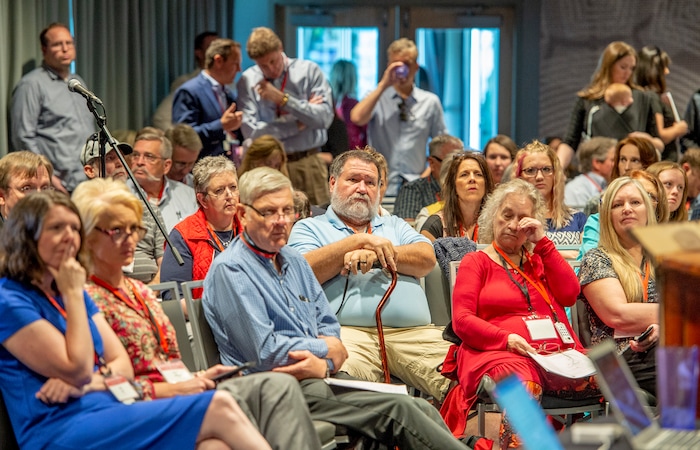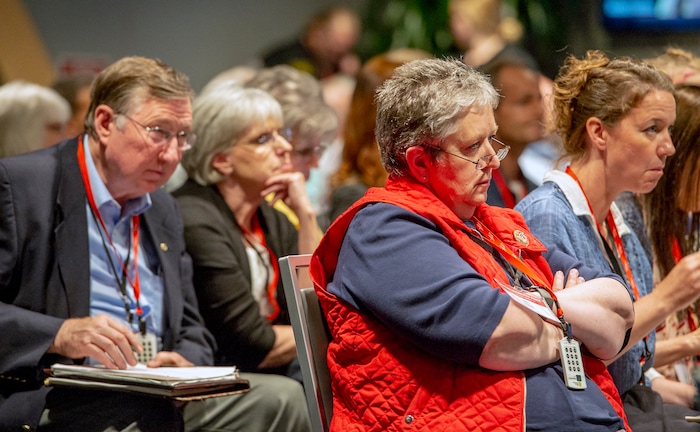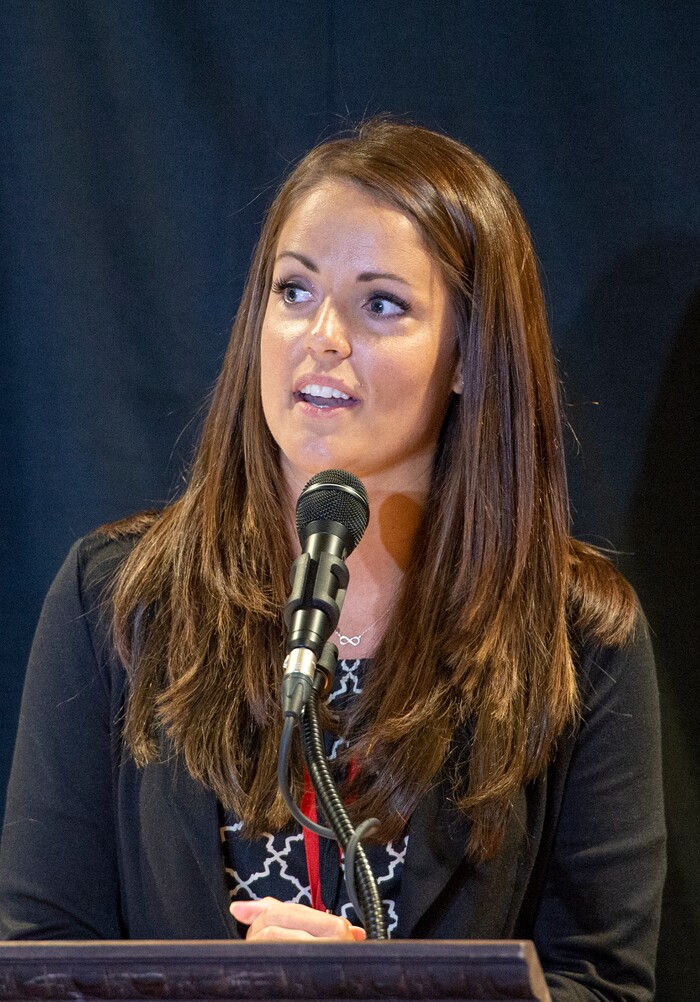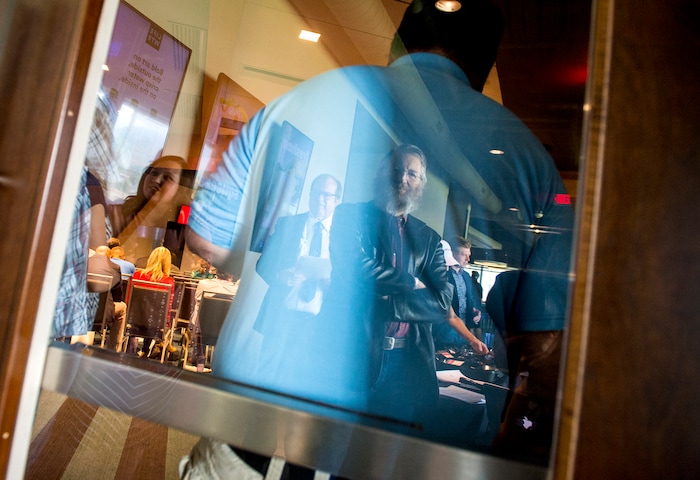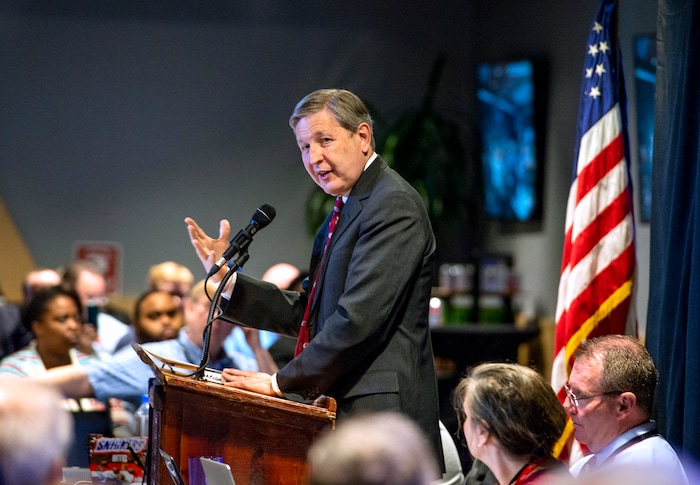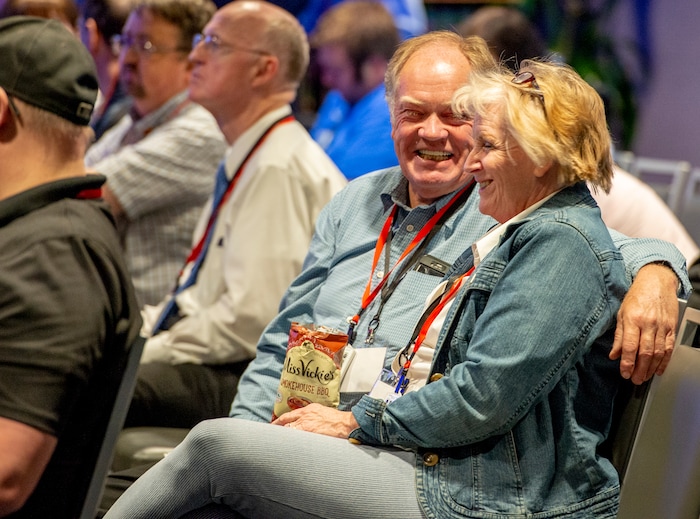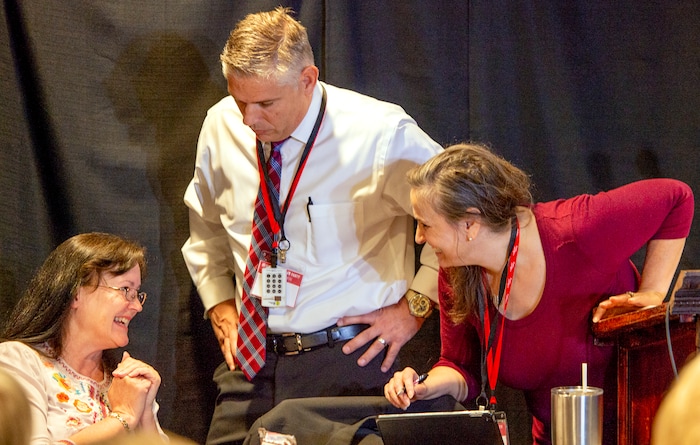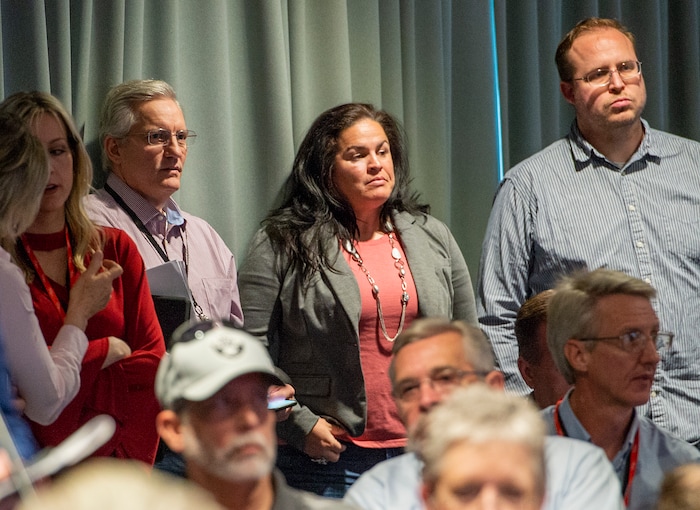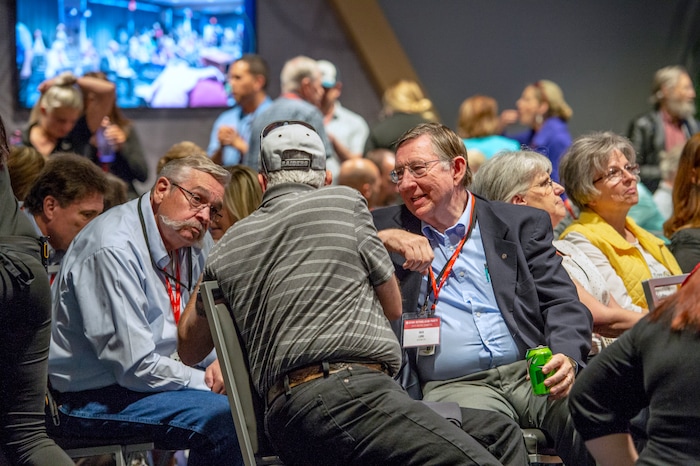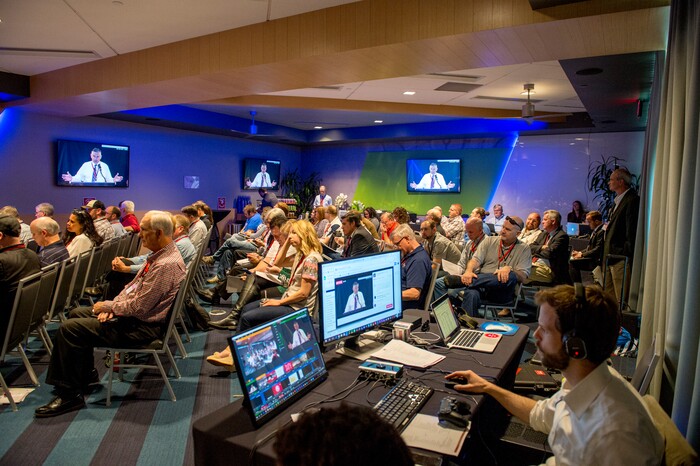Midvale • It was probably appropriate that the Utah GOP State Central Committee met Saturday at the Top Golf driving range clubhouse because teed-off moderate and conservative wings of the party spent the day swinging — at each other.
That included:
• The right wing successfully ousted — over protests by moderates — several minority and female members of the 183-member central committee of GOP leaders from around the state. It came despite complaints that it amounted to racism.
• Three blacks running for party vice chairman, out of a field of 13 candidates, also were unsuccessful — including right-wing former Chairman James Evans. The winner was even more conservative Kera Birkeland, the only woman in the crowded race.
• Right-wingers attacked centrist Chairman Rob Anderson for earlier removing party rules they had passed to expel some candidates if they collected signatures to qualify for the ballot. Anderson argues the rules violated state law and could have forced the state to remove the party and its candidates from the ballot.
• Similar to what happened at the recent 12-hour GOP state convention, delay tactics by conservatives stretched out the central committee meeting to five hours — when it was forced to adjourn because the contract for its rented room required it to leave then.
To tweak Anderson and moderates, conservatives called a long parade of points of order and forced extended debate on such usually noncontroversial items as the minutes, credentials and the agenda. On one vote to move forward, a delegate yelled out for others to pass it “for Christ’s sake,” bringing rare laughs on a tense day.
(Leah Hogsten | The Salt Lake Tribune) The Utah Republican Party Central Committee meets Saturday, May 19, 2018, to elect a new party vice chairman and debate several potential bylaw changes.
Party infighting centers on a 2014 election law, Senate Bill 54, which allows candidates to qualify for the ballot either through the traditional caucus-convention system and/or by collecting signatures.
Conservatives contend the law diminishes the role of convention delegates and tilts the nomination race in favor of big-money candidates. Moderates say a dual-track to the ballot offers more choice and results in nominees who better reflect the will of all Republicans instead of a far-right minority.
Some minorities ousted
Perhaps the most eye-catching action Saturday was to temporarily decertify several party auxiliaries — the Utah Republican Latino Coalition, Black Republicans, Utah Federated Republican Women, Young Republicans and Teen Aged Republicans. That action also removed their representatives from the GOP central committee.
Some conservatives question whether the auxiliaries are legitimate groups or are formed mostly to allow their leaders to join overall party leadership. Anderson tried to continue their existence, but right-wingers won a vote to temporarily oust them pending more proof of legitimacy.
“So I can’t vote because I’m Hispanic and a woman?” yelled out central committee member Carolina Herrin, a native of Brazil.
(Leah Hogsten | The Salt Lake Tribune) When the Utah GOP State Central Committee voted to oust members of auxilaries representing several minority groups and women, some members alleged racism. Committee member Carolina Herrin, center, took on one man in the crowd who said the opposition was pulling the race card. The Utah Republican Party Central Committee meets Saturday, May 19, 2018, to elect a new party vice chairman and debate several potential bylaw changes.
Another member yelled that the move was about party rules, not discrimination, and “I call bulls--- on the race card.” Herrin responded, “I call bulls--- on you.”
Herrin told The Tribune, “It’s a little ridiculous that they can’t let anyone vote unless they are white.” She personally was not ousted, because she was elected by Utah County delegates to serve as a central committee member — and was not the representative of an auxiliary.
New vice chairwoman
Meanwhile, minorities also had a tough day in the race to replace Vice Chairwoman Joni Crane, who recently resigned to run for office in Uintah County.
Among the 12 losing candidates were three blacks — including Evans, the former party chairman, who at least made it to the final round of voting.
The winner was Morgan County GOP Chairwoman Birkeland, the only woman in the crowded race.
(Leah Hogsten | The Salt Lake Tribune) Kera Birkeland was elected as the new vice chairwoman of the Utah Republican Party, defeating former Chairman James Evans 66-48 in the final round. The Utah Republican Party Central Committee meets Saturday, May 19, 2018, to elect a new party vice chairman and debate several potential bylaw changes.
Crystal Hovey, one of 11 candidates who had dropped out of the race earlier, said she and others withdrew to help consolidate conservative support for Birkeland.
She said while conservatives appreciate Evans’ support of the caucus-convention system — including initiating lawsuits against SB54 — his is “too liberal on other issues.”
Birkeland vowed to try to help unify the party but also to help continue lawsuits seeking to overturn SB54.
Of note, Anderson defeated Evans last year, contending his lawsuits against SB54 had nearly bankrupted the party and divided it. Evans on Saturday insisted he was not running to seek payback now but said he could help right a divided party.
Scott Sommerdorf | The Salt Lake Tribune Current Utah GOP party chairman James Evans gives his speech prior to the first vote for chairman at the Utah Republican Party Organizing Convention, Saturday, May 19, 2017. He was eliminated in the first round of voting.
All of the more moderate candidates who attacked the caucus-convention system, or called for major reforms in it, were eliminated in early rounds of voting.
Chairman criticized
Amid some of the delaying tactics, some conservatives scolded Anderson for unilaterally removing controversial bylaws they had added in a lightly attended special meeting earlier this year.
Those bylaws called for candidates in some congressional races to be expelled from the party if they attempted to qualify for the ballot by collecting signatures.
Anderson said that would violate state law. And under SB54, he said a party that does not allow signature collecting along with the caucus-convention system is to be removed from the ballot along with its candidates. Anderson said he acted to keep the party on the ballot and to follow the law.
(Leah Hogsten | The Salt Lake Tribune) l-r Utah GOP Parliamentarian Carrie Dickson, Chairman Rob Anderson and Lisa Shepherd review procedure during the meeting. The Utah Republican Party Central Committee meets Saturday, May 19, 2018, to elect a new party vice chairman and debate several potential bylaw changes.
But Janice Legler, chairwoman of the party’s Constitution and Bylaws Committee, said that’s just the interpretation of Anderson’s own lawyer — whom the central committee had fired as the party’s lawyer. She said other lawyers disagree, and Anderson was bound to follow orders by the central committee.
Conservatives put on the agenda a resolution to create an investigative committee to look into actions by Anderson. It was never considered because the committee ran out of time because of delaying tactics by the right wing.
Somewhat ironically — because of the forced end of the meeting Saturday — one of the bylaws that was not considered for lack of time was one to require the party to secure a meeting place for at least eight hours for all future central committee meetings.
Lawsuit update
Meanwhile, the party heard a report from Gene Schaerr, an attorney hired by a party committee set up to oversee appeals of a lawsuit against SB54. (Conservatives on the central committee earlier took away all power by Anderson to oversee the lawsuit).
Schaerr said the lawsuit is not so much about how candidates can qualify for the ballot but protecting the First Amendment rights of parties, churches and even Boy Scouts to choose their own rules for assembly and governance.
(Leah Hogsten | The Salt Lake Tribune) Attorney Gene Schaerr delivers his latest report to the state central committee on the status of the appeal of SB54 that upheld the state election law allowing candidates to qualify for the primary ballot by collecting signatures. The Utah Republican Party Central Committee meets Saturday, May 19, 2018, to elect a new party vice chairman and debate several potential bylaw changes.
“The central issue is really about the scope of the government’s power to regulate core functions and even messages of a political party or even indeed any voluntary expressive association under the First Amendment.,” he said.
“That’s really what is at stake: the scope of the First Amendment’s protection not only for political parties but all kinds of voluntary associations. That includes anything from the Boy Scouts to the neighborhood swim club maybe and churches.”

